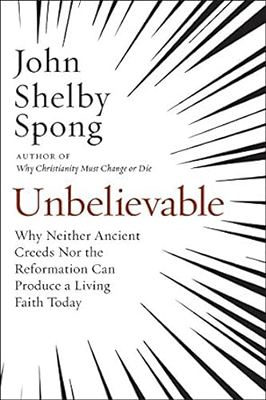Unbelievable
“Unbelievable: Why Neither Ancient Creeds nor the Reformation Can Produce a Living Faith Today” is a book written by John Shelby Spong, a controversial figure known for his progressive views within Christianity. In this book, Spong challenges traditional Christian doctrines and argues for a reinterpretation of the faith that is more compatible with contemporary understandings of science, ethics, and human experience.
Spong begins by critiquing the traditional creeds of Christianity, such as the Nicene Creed, which he sees as outdated and irrelevant to modern believers. He argues that these creeds are based on ancient cosmologies and metaphysical assumptions that are no longer credible in light of scientific discoveries and philosophical developments.
Drawing on biblical scholarship and historical research, Spong challenges traditional interpretations of key Christian doctrines, including the virgin birth, the divinity of Jesus, and the resurrection. He presents alternative readings of biblical texts that emphasize metaphorical or symbolic interpretations rather than literal truths.
Spong also addresses the legacy of the Protestant Reformation and its impact on modern Christianity. He argues that the reformers’ emphasis on doctrinal orthodoxy and biblical literalism has hindered the church’s ability to adapt to contemporary challenges and has contributed to its decline in relevance and influence.
Throughout “Unbelievable,” Spong advocates for a more inclusive and intellectually honest approach to Christianity, one that embraces diversity of belief and affirms the importance of critical thinking and moral integrity. He calls on Christians to move beyond outdated dogmas and embrace a faith that is grounded in love, compassion, and a commitment to justice.
Overall, “Unbelievable” presents a provocative critique of traditional Christianity and offers a vision for a more vibrant and relevant faith for the modern world. While controversial, Spong’s ideas have sparked important conversations about the future of Christianity and its relationship to contemporary culture and society.

